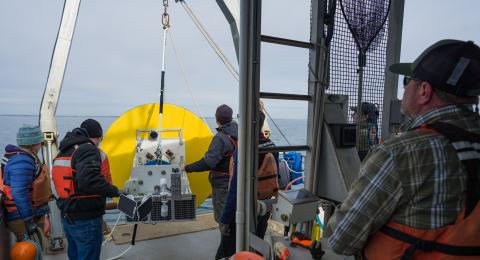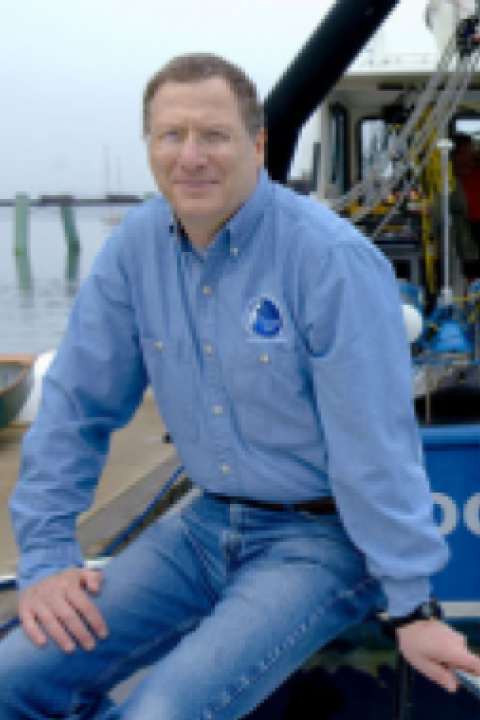The Ocean Engineering Ph.D. program at UNH provides a comprehensive education at a top-tier research university, preparing you to tackle critical challenges facing our oceans. You’ll engage in advanced research on topics such as ocean renewable energy, ROVs, and ocean mapping, utilizing state-of-the-art facilities like the Chase Ocean Engineering Lab and sea vessels. Collaborations with the National Oceanic and Atmospheric Administration, UNH’s Marine School, and the Atlantic Marine Energy Center further enhance your research experience.
Why pursue a Ph.D. in ocean engineering?
As a student in our ocean engineering Ph.D. program, you’ll work toward developing real-world, sustainable solutions to the many urgent problems threatening the health of our oceans and planet. Rising sea levels, increasing populations close to the coast, and more frequent and severe storms all are issues ocean engineers are addressing. This interdisciplinary program will prepare you to interact with professionals in diverse disciplines within the ocean science community. An increasing number of positions for marine engineers coupled with a low number of ocean engineering programs nationwide means a very favorable job outlook.
Why Choose UNH's Ph.D in Ocean Engineering Program?
UNH’s ocean engineering program provides hands-on research in ocean renewable energy, ROVs, ocean mapping, ocean acoustics and coastal processes that will give you practical experience in your chosen field. You’ll work closely with outstanding faculty and researchers in state-of-the-art engineering facilities, and benefit from strong partnerships with private organizations and the National Oceanographic and Atmospheric Administration, giving you distinct career advantages after graduation.
Potential career areas
- Academia
- Aquaculture
- Coastal engineering (structures, erosion)
- Environmental consulting
- Government (NOAA, local, state and federal agencies)
- Marine robotics
- Ocean acoustics
- Ocean equipment and instrumentation manufacture
- Ocean mapping
- Oceanographic research
- Offshore structures
- Renewable energy (wave and tidal)
Curriculum & Requirements
Students admitted to the ocean engineering Ph.D. program come from traditional engineering degree programs including physics, mathematics, computer science, and in some cases, marine science programs. Those entering the Ph.D. program with a B.S. degree from an engineering program should be prepared to begin the Ph.D. program directly. Those coming from a B.S. in physics, mathematics, or computer science will have their transcripts more carefully reviewed on an individual basis, as additional courses may be required.
Degree Requirement
The full course requirements below are for students entering with a relevant B.S. degree.
Students entering with a relevant M.S. degree with comparable content must take a minimum of six of the listed courses (exclusive of dissertation research and Ocean Seminars), of which at least three must be at the 900-level. Students entering with an M.S. must either take the listed core courses or demonstrate equivalent knowledge from other programs to be able to successfully pass the OE Ph.D. qualifying exam. As part of preparation for their research, students often take additional, dissertation-specific courses. Additional graduate courses may also be required based on recommendations by the supervisor or dissertation committee.
| Code | Title | Credits |
|---|---|---|
| Core Courses | ||
| OE 990 & OE 991 | Ocean Seminars I and Ocean Seminars II | 2 |
| Select one course from the following courses in oceanography or ocean science: | 3-4 | |
BIOL 855 | Biological Oceanography | |
ESCI 852 | Chemical Oceanography | |
ESCI 858 | Introduction to Physical Oceanography | |
ESCI 859 | Geological Oceanography | |
| Complete the following core courses in ocean engineering: | 18 | |
ESCI 820 | Ocean Measurements Lab | |
OE 853 | Ocean Hydrodynamics | |
OE 854 | Ocean Waves and Tides | |
ESCI 864 | Spectral Analysis of Geophysical Time Series Data | |
OE 865 | Underwater Acoustics | |
| Select two 900-level courses from the following: | 6-8 | |
IAM 932 | Graduate Partial Differential Equations | |
ME 944 | Nonlinear Control Systems | |
IAM 950 | Spatiotemporal and Turbulent Dynamics | |
IAM 962 | Numerical Partial Differential Equations | |
OE 965 | Advanced Underwater Acoustics | |
OE 972 | Hydrographic Field Course | |
ESCI 973 | Seafloor Characterization | |
ME 995 | Graduate Special Topics | |
OE 995 | Graduate Special Topics | |
ESCI 996 | Advanced Topics | |
| Select two 800- or 900-level courses from MATH or IAM or select both: | 6-8 | |
ME 886 | Introduction to Finite Element Analysis | |
ME 986 | Advanced Finite Element Analysis | |
| Select two additional CEPS electives (one 800-level and one 900-level): | 6-8 | |
| Total Credits | 41-48 | |
The general progress of a student through this program is expected to follow the time frame below:
- Year 1: Coursework
- Year 2: Coursework, qualifier by the end of the year, form graduate dissertation committee
- Year 3: Research, dissertation proposal defense
- Year 4: Research
- Year 5: Research, dissertation defense
The course selection and sequencing will be established in consultation with the student's guidance committee. There will be a qualifying examination on the core courses by the end of the second year. The goal of this exam is to test the breadth of a student's knowledge in topic areas essential to ocean engineering. A formal dissertation proposal defense will include a written proposal, a public presentation and an oral exam. After successful completion of the qualifying exam and dissertation proposal defense, the student will be advanced to candidacy. The dissertation will be defended in a public forum when completed.
Program Learning Outcomes
- Can conduct original research and develop new technologies in ocean engineering.
- Communicate research results through peer-reviewed publications and public presentations.
Deadline
Applications must be completed by the following deadlines in order to be reviewed for admission:
- Fall: Jan. 15 (for funding); April 1 (recommended US; final international); July 1 (final)
- Spring: Dec. 1
- Summer: N/A
- Special: N/A
Application fee: $65
Campus: Durham
New England Regional: CT MA ME VT
Accelerated Masters Eligible: No
New Hampshire Residents
Students claiming in-state residency must also submit a Proof of Residence Form. This form is not required to complete your application, but you will need to submit it after you are offered admission, or you will not be able to register for classes.
Transcripts
If you attended UNH or Granite State College (GSC) after September 1, 1991, and have indicated so on your online application, we will retrieve your transcript internally; this includes UNH-Durham, UNH-Manchester, UNH Non-Degree work and GSC.
If you did not attend UNH, or attended prior to September 1, 1991, then you must upload a copy (PDF) of your transcript in the application form. International transcripts must be translated into English.
If admitted, you must then request an official transcript be sent directly to our office from the Registrar's Office of each college/university attended. We accept transcripts both electronically and in hard copy:
- Electronic Transcripts: Please have your institution send the transcript directly to grad.school@unh.edu. Please note that we can only accept copies sent directly from the institution.
- Paper Transcripts: Please send hard copies of transcripts to: UNH Graduate School, Thompson Hall- 105 Main Street, Durham, NH 03824. You may request transcripts be sent to us directly from the institution or you may send them yourself as long as they remain sealed in the original university envelope.
Transcripts from all previous post-secondary institutions must be submitted and applicants must disclose any previous academic or disciplinary sanctions that resulted in their temporary or permanent separation from a previous post-secondary institution. If it is found that previous academic or disciplinary separations were not disclosed, applicants may face denial and admitted students may face dismissal from their academic program.
Letters of recommendation: 3 required
Recommendation letters submitted by relatives or friends, as well as letters older than one year, will not be accepted.
Personal Statement/Essay Questions
Prepare a brief but careful statement regarding:
- Reasons you wish to do graduate work in this field, including your immediate and long-range objectives.
- Your specific research or professional interest and experiences in this field.
Important Notes
All applicants are encouraged to contact programs directly to discuss program-specific application questions.
International Applicants
Prospective international students are required to submit TOEFL, IELTS, or equivalent examination scores. English Language Exams may be waived if English is your first language. If you wish to request a waiver, then please visit our Test Scores webpage for more information.
Explore Program Details
The School of Marine Science and Ocean Engineering serves as an interdisciplinary nexus for marine science and ocean engineering teaching and research across the University.
































